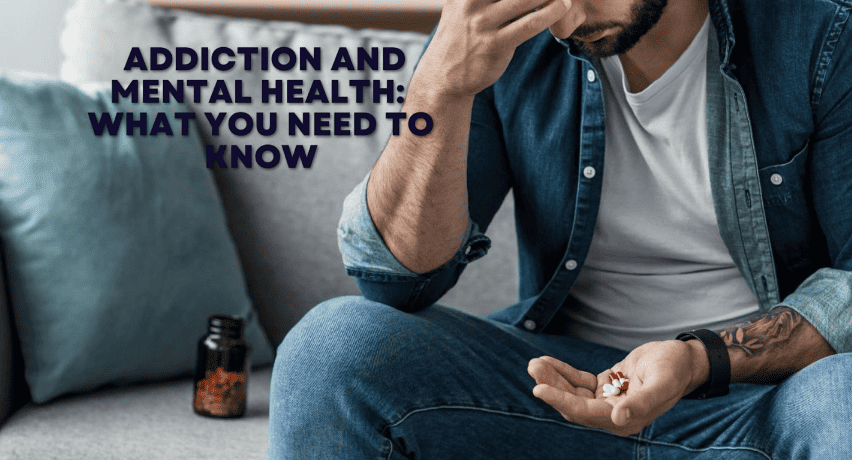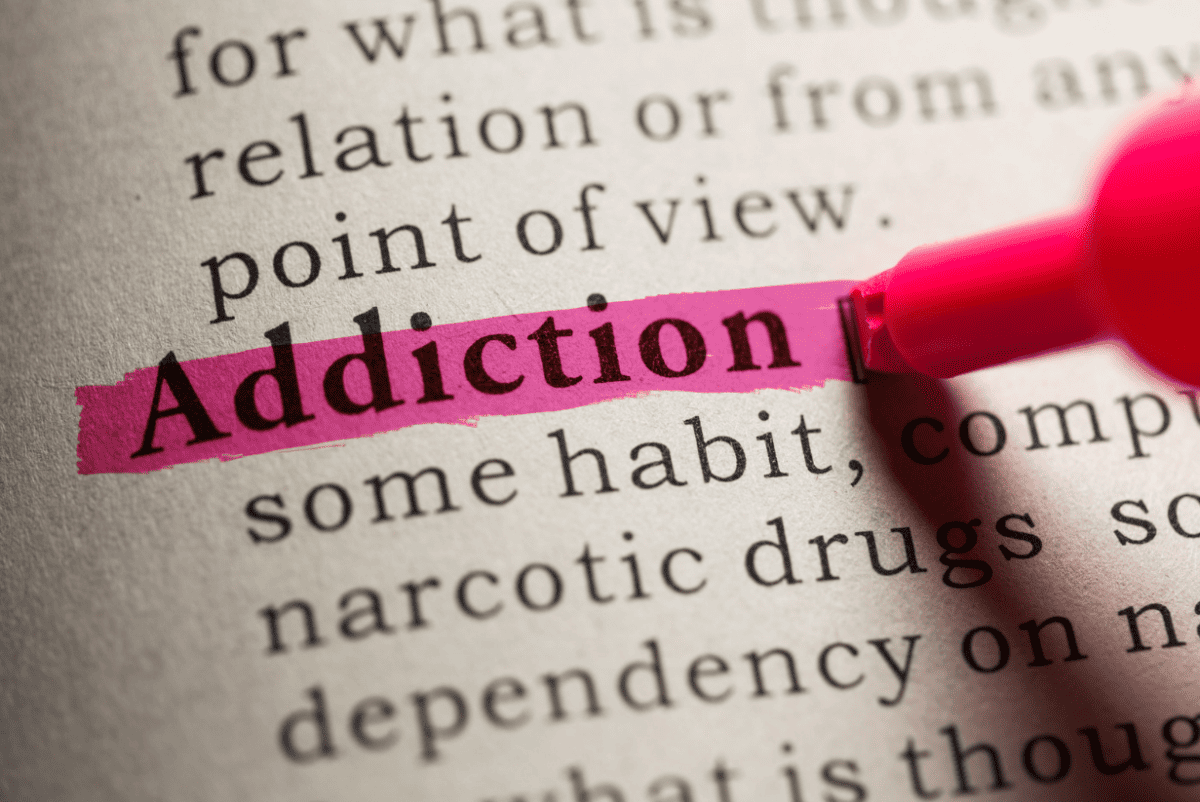Understanding the intricate relationship between addiction and mental health is fundamental in addressing the complexities of human behavior and well-being. The intertwining nature of these two phenomena presents a challenging landscape for individuals, healthcare professionals, and society at large.
The statistics reveal staggering global burdens. 24.7% of individuals with drug disorders have an opioid disorder, encompassing both prescription pain relievers or “painkillers” and heroin.
Addiction, whether to substances or behaviors, and mental health disorders often intersect, each influencing and exacerbating the other in a dynamic and complex manner. The connection between addiction and mental health stems from various factors, including genetics, brain chemistry, environmental influences, and societal attitudes.
Exploring the link between addiction and mental health provides insight into the underlying mechanisms, treatment approaches, and societal implications, paving the way for more holistic and effective interventions to support individuals struggling with these interconnected issues.

The Interplay Between Addiction and Mental Health
Mental health conditions increase addiction risk. Take depression and anxiety—prevalent disorders; they disrupt neurotransmitters like serotonin and dopamine that regulate mood. Self-medication offers alluring, immediate relief.
Substance abuse also exacerbates mental health symptoms. Alcohol enhances GABA activity, then suppresses reuptake. The pendulum swings between euphoria and anxiety from distorted chemical signals.
The relationship between addiction and mental health is multifaceted. Mental health conditions like depression and anxiety increase the risk of developing a substance use disorder.
They disrupt neurotransmitters like serotonin and dopamine that regulate mood, making self-medication an appealing quick fix. However, substance abuse also exacerbates the symptoms of mental illness due to its impact on brain chemistry.
Addiction and mental health are intricately intertwined, with each influencing and exacerbating the other in a complex cycle. Due to their intricate nature, it’s important to understand the intricacies of addiction and mental health.
Understanding this is essential for effective treatment and support strategies to address the holistic needs of individuals struggling with these conditions. This interplay flows both ways in a dangerous dance. Alcohol enhances GABA activity initially, inducing euphoria, lowered anxiety, and loosened inhibitions.
However, it later suppresses the reuptake of GABA, leading to anxiety when the central nervous system is overwhelmed. The brain’s intricate balance is disrupted. Over time, mood instability, sleep disruption, aggression, and impaired cognition can emerge.
Biological Basis of Addiction and Mental Health Disorders
The biological basis of addiction and mental health disorders involves intricate interactions among neurotransmitters, genetics, and neurobiological changes in the brain, influencing susceptibility, symptoms, and treatment responses.
All these factors appear visually as persistent changes in mood, sleep patterns, energy levels, or social withdrawal may indicate deteriorating mental health. All these signs your mental health is getting worse and requires quick intervention.
Often these factors contribute to the complex interplay between addiction and mental health, shaping individuals’ experiences and outcomes.
Neurotransmitters and Brain Chemistry
Neurotransmitters are chemical messengers in the brain that play crucial roles in regulating mood, emotions, cognition, and behavior. Dopamine, serotonin, norepinephrine, and gamma-aminobutyric acid (GABA) are among the key neurotransmitters involved in both addiction and mental health disorders.
In addiction, substances such as drugs or alcohol often hijack the brain’s reward system, leading to excessive release of dopamine, which reinforces the addictive behavior.
Mental health disorders like depression, anxiety, and schizophrenia are associated with imbalances in neurotransmitter levels, affecting mood regulation, stress response, and cognitive function.
Genetic Predisposition
Genetics plays a significant role in predisposing individuals to both addiction and mental health disorders. Certain genetic variations can influence an individual’s susceptibility to developing these conditions.
Family history studies and twin studies have demonstrated a higher likelihood of addiction or mental illness among individuals with close relatives who also struggle with these disorders.
However, genetics alone do not determine an individual’s risk; environmental factors and life experiences also play critical roles in shaping the development of addiction and mental health disorders.
Neurobiological Changes Associated with Addiction and Mental Illness
Chronic substance abuse can lead to profound changes in the brain’s structure and function, contributing to the development of addiction. These changes may include alterations in neurotransmitter systems, neuroplasticity, and neural circuitry involved in reward processing, decision-making, and impulse control.
Similarly, mental health disorders are associated with neurobiological abnormalities, such as alterations in brain volume, connectivity, and activity patterns in regions implicated in mood regulation, emotion processing, and stress response.
Overlapping neurobiological pathways and mechanisms contribute to the co-occurrence of addiction and mental illness, underscoring the complex interplay between biological factors and psychological processes in these conditions.
Understanding the intricate interplay of neurotransmitters, genetic predisposition, and neurobiological changes provides valuable insights into the underlying mechanisms of addiction and mental health disorders, informing the development of targeted interventions and personalized treatment approaches.
Social and Environmental Influences
Social and environmental influences significantly impact addiction and mental health, shaping individuals’ vulnerability, coping strategies, and access to support systems, thereby playing pivotal roles in prevention, recovery, and overall well-being.
Addressing these factors is crucial to understanding the multifaceted nature of addiction and mental health disorders in a holistic context.
Impact of Social Support Networks
Social support networks, including family, friends, and community, play a crucial role in both the prevention and recovery from addiction and mental health disorders. Positive social support can provide emotional encouragement, practical assistance, and a sense of belonging, which can buffer against stress and enhance resilience.
Conversely, lack of social support or negative social influences can exacerbate feelings of isolation, loneliness, and distress, increasing the risk of substance abuse and worsening mental health symptoms.
Stigma and Discrimination
Stigma and discrimination associated with addiction and mental illness can have profound effects on individuals’ well-being, treatment-seeking behavior, and social integration. Public stigma perpetuates negative stereotypes and attitudes, leading to social exclusion, shame, and reluctance to disclose or seek help for these conditions.
Self-stigma, internalized by individuals experiencing addiction or mental health disorders, can undermine self-esteem, self-efficacy, and recovery efforts, perpetuating a cycle of shame and secrecy.
Socioeconomic Factors in Addiction and Mental Health
Socioeconomic factors such as poverty, unemployment, housing instability, and lack of access to education and healthcare significantly influence the prevalence, course, and outcomes of addiction and mental health disorders.
Individuals from marginalized or disadvantaged backgrounds face increased exposure to stressors, trauma, and environmental risk factors associated with substance abuse and poor mental health. Socioeconomic disparities also affect access to treatment and support services, exacerbating inequalities in health outcomes and perpetuating cycles of disadvantage.
Cycle of Addiction and Mental Illness
Bidirectional Relationship
The relationship between addiction and mental illness is bidirectional, with each condition influencing and exacerbating the other over time. Substance abuse can trigger or worsen symptoms of mental health disorders, such as depression, anxiety, or psychosis, through neurobiological, psychological, and social pathways.
Conversely, untreated mental illness can increase vulnerability to substance abuse as individuals may turn to drugs or alcohol as a form of self-medication to alleviate distressing symptoms or cope with underlying emotional pain.
The Role of Cravings and Triggers
Cravings, defined as intense urges or desires to use substances, and triggers, environmental cues, or emotional states that prompt substance use, play pivotal roles in the cycle of addiction.
Cravings can be triggered by external cues (e.g., seeing drug paraphernalia) or internal cues (e.g., experiencing stress, anxiety, or negative emotions).
Learning to identify and cope with cravings and triggers is a critical component of addiction treatment and relapse prevention strategies, helping individuals develop healthier coping mechanisms and reduce the likelihood of relapse.
Addressing Comorbidity in Treatment Approaches
Given the high prevalence of co-occurring addiction and mental health disorders, seeking care at a Specialized Dual Diagnosis Rehab Center that offers integrated treatment is essential for optimal outcomes.
Comprehensive treatment may involve a combination of pharmacotherapy, psychotherapy, behavioral interventions, and social support services tailored to the individual’s specific needs and preferences.
Treating comorbid conditions concurrently can enhance treatment adherence, reduce the risk of relapse, and improve overall functioning and quality of life for individuals experiencing addiction and mental illness.
Unmasking Common Risk Factors
Genetics load the gun, environment pulls the trigger. Shared vulnerabilities, both genetic and environmental, drive the development of co-occurring disorders. Take adverse childhood events (ACEs)—trauma like abuse or parental loss. ACEs alter neurological pathways for processing emotions.
This manifests later as mental health or addiction issues. Social media also stokes anxiety and depression, especially in youth who are still developing coping skills.
Genetics and environmental factors contribute significantly to the development of co-occurring substance abuse and mental health disorders. Familial history of either condition indicates shared genetic vulnerabilities like variants in serotonin transporters, making individuals biologically more susceptible.
Adverse childhood experiences (ACEs) also alter neurological pathways involving emotional processing and stress response. Such childhood trauma leaves imprints that resurface later as mental health issues or tendencies toward addiction.
Emotional dysregulation often manifests in adolescence. Social media use has also been implicated as an environmental risk factor, especially for youth still developing coping skills and self-identity.
Studies reveal that excessive time on platforms like Facebook, Instagram, and TikTok is associated with body image issues, disordered eating patterns, anxiety, depression, and cyberbullying in teens.
Social comparison and fear of missing out breed discontentment. This can drive self-medication with substances to numb emotional distress.
Diagnosis and Treatment: A Delicate Balance
Navigating co-occurring disorders requires skill. Symptoms intertwine; misdiagnosis lurks. Integrated assessment tools evaluate social, medical, and family histories alongside psychological testing.
Medication targets chemical imbalances while evidence-based therapies like CBT build coping strategies. DBT regulates emotions. Treatment modalities work concurrently, balancing different needs.
With meticulous care, recovery is possible. Remission is the goal; perfection is not required. Progress ebbs and flows. It goes both ways. Disorders influence each other, a dangerous dance. Integrated treatment is key.
Navigating diagnosis and treatment of co-occurring disorders requires meticulous care, as substance abuse problems and mental health symptoms often feed into each other.
Integrated assessment tools that gather psychosocial histories in addition to physical, familial, and genetic information allow for more accurate diagnosis. This prevents mislabeling conditions.
Once diagnosed, co-occurring disorders are best addressed with coordinated specialty care which treats both simultaneously. Medications target specific chemical or hormonal imbalances in the brain’s messaging system, while evidence-based therapies build coping strategies and self-awareness.
Cognitive behavioral therapy (CBT) and dialectical behavior therapy (DBT) are common options. Motivational enhancement therapy also helps individuals overcome ambivalence toward change.
Overcoming Barriers: Social Media’s Role
Social media has revolutionized communication—and mental health. Limiting use to 30 minutes daily significantly boosts well-being. Meanwhile, over 3 hours daily during adolescence heightens the risk for issues like low self-esteem, poor sleep, and body image concerns.
We must address this barrier. Education empowers wise usage; monitoring protects developing minds. Balancing connectivity and health is key.
Recovering from co-occurring disorders is challenging to face alone. Support systems of friends, family, and broader communities provide the social, emotional, and even financial support to persevere.
Their encouragement celebrates incremental wins, while their empathy during setbacks fosters resilience to continue progressing despite pitfalls. However, loved ones should set healthy boundaries around enabling behaviors that sustain addiction. Al-Anon’s detachment practices help stabilize the dynamic.
Peer support groups create non-judgmental spaces to share openly, ask for advice, and find motivation through role models who relate deeply to the struggle.
12-step programs like AA and NA provide structured mentorship opportunities between sponsors and sponsors working through the recovery process. Knowing others navigate this terrain sparks hope.

The Unsung Heroes: Support Systems
Recovering from co-occurring disorders rarely happens alone. Family and friends provide moral support and accountability. But their help shouldn’t enable destructive behaviors. With care, they can nurture progress.
Support groups create safe spaces for sharing wins and losses. Peers relate deeply, offering empathy and non-judgment. Meetings offer hope: “If they can heal, perhaps I can too.”
Pioneering the Future: Research and Treatment
Genetic research examines specific genes and epigenetic markers associated with co-occurring disorders. Such targets may inform personalized medicine approaches.
Integrated treatment models address both mental health and addiction issues concurrently. They boost motivation, teach sober coping skills tailored to individuals.
While future advancements kindle hope, skillful navigation of today’s resources fosters steady progress. Recovery is a journey, not a destination. Each step forward counts.
Addiction and Mental Health – FAQs
1. How does addiction affect mental health and quality of life?
Addiction can exacerbate mental health issues by disrupting brain chemistry and functioning, leading to increased symptoms of depression, anxiety, and other disorders. It can also impair relationships, work, and overall quality of life due to the preoccupation with obtaining and using substances.
2. What is the link between depression and addiction?
Depression can predispose individuals to addiction as they may use substances to self-medicate negative emotions. Conversely, substance abuse can worsen depression symptoms and increase the risk of developing a depressive disorder.
3. What is the link between mental illness and alcoholism?
Mental illness and alcoholism often co-occur, with individuals using alcohol to cope with symptoms of mental health disorders. Alcohol abuse can exacerbate mental illness and vice versa, leading to a cycle of dependency and worsening symptoms.
4. What is addiction linked to?
Addiction is linked to a combination of genetic, environmental, and psychological factors. Genetic predisposition, trauma, stress, peer influence, and availability of substances all play roles in the development of addiction.
5. How are addiction and mental health related?
Addiction alters brain chemistry and circuitry, particularly in areas related to reward, motivation, and decision-making. Chronic substance abuse can lead to neuroadaptive changes that contribute to cravings, compulsive drug-seeking behavior, and diminished self-control.
6. How is addiction related to stress?
Stress can trigger cravings and increase the risk of relapse in individuals with addiction. Chronic stress also dysregulates the brain’s stress response system, making individuals more susceptible to substance abuse as a coping mechanism.
7. Is addiction a disorder related to emotion?
Yes, addiction involves dysregulation of emotional processing and regulation systems in the brain. Substance abuse often serves as a maladaptive coping mechanism for managing emotions, leading to cycles of addiction and emotional instability.
8. What comes first, depression or substance abuse?
It varies among individuals, but depression can precede substance abuse as individuals may turn to drugs or alcohol to alleviate depressive symptoms. Substance abuse can also trigger or exacerbate depression.
9. Which drugs cause depression?
Several drugs, including alcohol, opioids, benzodiazepines, and stimulants, can contribute to or worsen symptoms of depression. Chronic use of these substances can disrupt neurotransmitter balance and affect mood regulation.
10. What is mental health?
Mental health encompasses emotional, psychological, and social well-being. It influences how individuals think, feel, and behave, as well as how they cope with stress, interact with others, and make decisions. Mental health is essential for overall health and quality of life.


